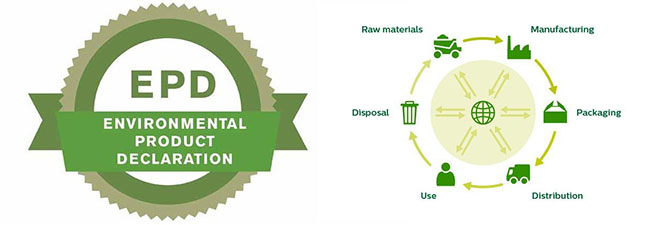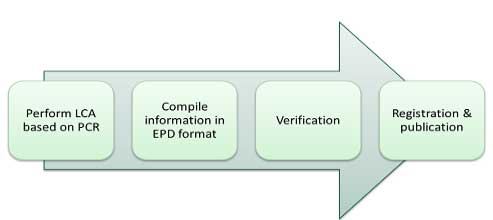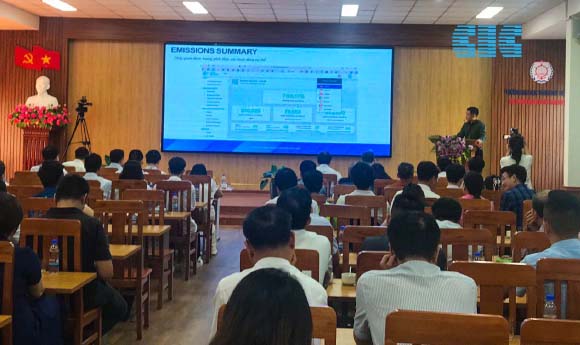
Công ty cổ phần công nghệ và tư vấn CIC
Specialized
Home > News > Specialized > What is an Environmental Product Declaration (EPD)? Benefits and Implementation Process of EPD
Successfully Organize a Conference on the Application of Bentley's BIM/Digital Twin Solutions...

Net Zero: CIC Launches Greenhouse Gas Inventory Website

Bentley Energy Solution - A Comprehensive Solution for the Energy Sector

Release of enjiCAD 2025 SP2: Elevating Design Performance

5 Technology Trends Shaping 2025
Nội dung chính
What is an Environmental Product Declaration (EPD)? Benefits and Implementation Process of EPD
14/10/2024
Lượt xem 63
What is EDP?
EPD (Environmental Product Declaration) is a complete document prepared by manufacturers according to international standards (such as ISO 14025, EN 15804 ...). This profile is verified and registered on the EPD International platform, indicating the environmental performance of a product throughout the production and use process. By using pre-defined parameters, EPD ensures transparency and reliability of environmental information, helping consumers choose products and services with lower environmental impacts, contributing to building a sustainable future.
A product the beginning to its final complete processing or recycling has many impacts on the environment: the most widely known impact of global warming due to greenhouse gases (carbon footprint), to impacts such as eutrophication (abnormal growth of aquatic organisms, such as algae, due to reduced aquatic animal population density), the depletion of the ozone layer, causing acid rain, soil erosion, reduction of natural resources and many more… therefore, an EPD assessment to obtain declared information on the environmental performance of the product is necessary.

The EPD document includes:
• LCA report results (according to ISO 14040/14044 standards)
• Description of business and products
• Assumptions used in LCA studies for different life cycle stage ranges
• The calculation rules used (e.g. PCR)
EPD Implementation Progress
- Conduct LCA reporting (ISO 14040/14044)
- Prepare EPD documents according to the form issued by EPD International
- After submission, the application will be reviewed by a third party to ensure complete information and transparent data.
- Once reviewed and approved, the EPD dossier will be publicly available on the EPD International website.

What values does EPD bring?
EPD is a transparent demonstration of the product's impact on the environment, so consumers can grasp information about the product, thereby making appropriate consumption choices. In addition to supporting business factors, EPD is also a document required by many stakeholders, including the state and private sectors. In addition, some green building standards such as LEED and BREEAM also give priority to Building Material products with EPD verification records.
Using green and recycled materials, saving energy, meeting international quality standards, minimizing waste and managing sustainable supply chains are important factors in minimizing negative impacts on the environment. EPD certification not only supports the selection of products with lower environmental impacts, but also promotes the building of a sustainable future and promotes the overall development of society.
Through commitment and strict implementation of environmental standards and regulations, we can move towards a future of harmony between humans and nature, where products are produced and consumed responsibly, respecting the balance of the ecosystem, and actively contributing to the protection of the environment and our planet.
Criteria for obtaining EPD
To achieve EPD certification, a product must meet a number of strict criteria related to sustainability and environmental friendliness. Below are the requirements necessary for a product to be
EPD certified
Use environmentally friendly materials
Products should be manufactured using green and recyclable materials. This is to minimize the use of resources and energy, and limit the release of toxic substances and emissions during the manufacturing process.
Energy saving
Products must apply energy-saving technology and production processes to minimize greenhouse gas emissions and environmental impact.
Compliance with quality standards
Products must meet international quality standards and comply with environmental regulations. This ensures that the product fully meets the requirements of sustainability and environmental friendliness.
Waste Reduction
Products must minimize waste and comply with waste disposal standards. This helps to minimize environmental impact and ensure product sustainability.
Supply Chain Management
Products need to be produced and managed within a sustainable supply chain. This ensures environmental and social friendliness throughout the entire production and supply of the product.
Why we need EPD?
It can be seen that EPD certification plays an important role in ensuring transparency and reliability of environmental information of products. By meeting strict criteria for sustainability and environmental friendliness, EPD allows consumers to have a clearer view of the environmental performance of products throughout the production and use process.
Using green and recycled materials, saving energy, meeting international quality standards, minimizing waste and managing sustainable supply chains are important factors in minimizing negative impacts on the environment. EPD certification not only supports the selection of products with lower environmental impacts, but also promotes the building of a sustainable future and promotes the overall development of society.
Through commitment and strict implementation of environmental standards and regulations, we can move towards a future of harmony between humans and nature, where products are produced and consumed responsibly, respecting the balance of the ecosystem, and actively contributing to the protection of the environment and our planet.
Additionally, EPD International also offer Climate Declaration that shows the emissions of greenhouse gases, expressed as CO2-equivalents. It is based on verified results a lifecycle assessment (LCA) performed as basis for an EPD in accordance with ISO 14025.
What CIC have?
With a team of experts with many years of experience in fields such as cement, iron and steel, oil and gas, construction, mining..., CIC provides LCA consulting services and EPD documentation preparation in the Vietnamese market as well as sustainable development environmental services and carbon emission reduction solutions.
For more information about our greenhouse gas inventory and environmental certification services, please contact:
- CIC Technology and Consulting Joint Stock Company - Center for License for Mining and Construction Materials Industry
- Mr. Quynh: 0866059659 / Ms. Thuy: 0332268626




